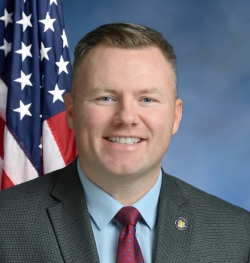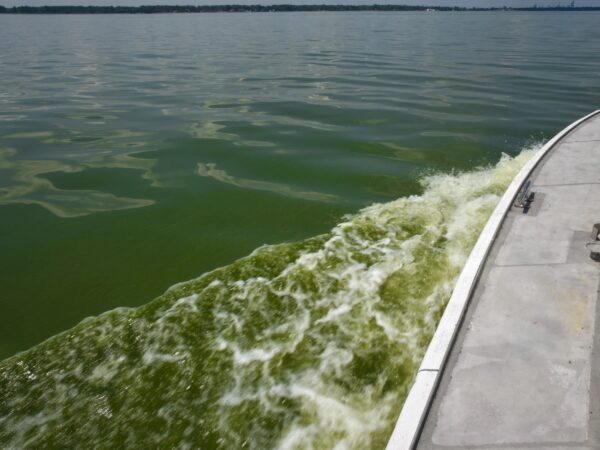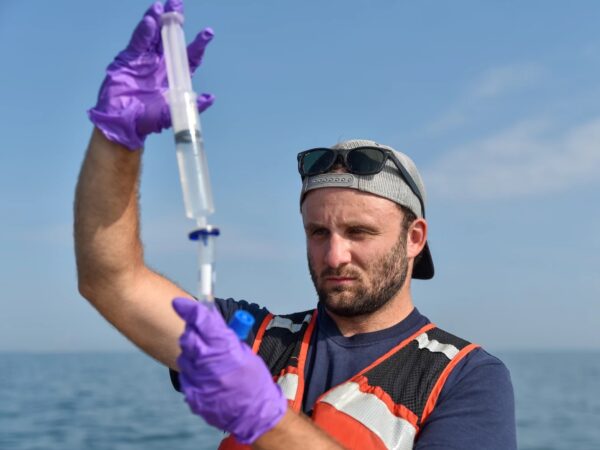
Should natural resources like the Great Lakes have the same legal right to protection from harm as a person has? Including the right to be free from exploitation as a commodity for financial gain?
New York state Assemblyman Patrick Burke thinks so and has introduced formal legislation that would provide for those rights.
Burke’s legislation, the Great Lakes Bill of Rights, calls for a list of protections including the right to “exist, flourish and naturally evolve and be restored by culpable parties.” The legislation would also provide the same rights to watersheds and channels that flow to the Great Lakes and a provision in the bill would prevent the lakes from becoming privatized and monetized.
Burke, a Democrat from greater Buffalo, decided to pursue the legislation after observing similar action in Toledo where voters approved a Lake Erie Bill of Rights law, Burke’s Legislative Director, David Bojanowski, said.
The Lake Erie bill “essentially gave personhood status” to the lake and made Toledo residents the legal guardians of it, Bojanowski said.
A lawsuit ensued and a federal judge struck down the Toledo initiative saying it was vague, aspirational and a “textbook example of what a municipal government cannot do.” The judge noted that Lake Erie is not a pond in Toledo and that municipal law is subordinate to state law when they conflict.
Agricultural interests were the primary opponents to the Lake Erie law.
But Assemblyman Burke is proceeding with his legislation in spite of the court’s ruling on the Toledo law and Bojanowski said Burke is optimistic that a version of the legislation will become law.
The focus now is to advance the bill and to craft its language “to include strong enforcement mechanisms directed at polluters and bad actors, all the while learning from the obstacles in place to the Toledo Lake Erie Bill of Rights that made the bill vulnerable to federal court scrutiny,” Bojanowski told Great Lakes Now.
The New York bill is in the Environmental Conservation Committee and Bojanowski said he is hopeful it will advance in 2023.
Burke’s original goal was to draft a Lake Erie specific bill similar to Toledo’s, according to Tish O’Dell, an organizer with the Community Environmental Legal Defense Fund (CELDF).
Burke’s thinking evolved as he learned about Rights of Nature legislation, as it commonly does when elected officials learn more about the issue, Odell said.
Based on his comments, O’Dell said Burke understands that humans are interconnected and nature is as well. “Simply recognizing rights of a single Great Lake is not enough as the Great Lakes are also interconnected,” O’Dell told Great Lakes Now.
CELDF contributed to drafting of the Great Lakes Bill of Rights.
Similar to the Toledo law, if adopted the New York law would likely face court challenges, University of Detroit Mercy Environmental Law professor Nick Schroeck told Great Lakes Now.
And while Schroeck said he appreciates the sentiment of the law, he expects it “would have a tough road on judicial review.”
Laws like New York’s proposed Great Lakes Bill of Rights attempt to fill the gaps in our current system where resources continue to be exploited and polluted, according to Schroeck.
“The conflict is that society needs to use the Great Lakes and other natural resources, and “use” entails some harm to those resources. So, you have a threshold question as to whether any use of a resource may violate a law like the Great Lakes Bill of Rights,” Schroeck said.
Schroeck also pointed to an issue identified as a barrier by the judge in the Toledo decision. That a court would find that the proposed Great Lakes Bill of Rights is overly broad or in conflict with other laws, Schroeck said, including federal laws, international agreements and treaties.
While preventing pollution and allowing waterways to naturally evolve are pillars of the Great Lakes bill of rights law, Traverse City’s Dave Dempsey points to the anti-monetization and privatization language in the law and their importance.
Dempsey has worked on water policy issues for 40 years including a tenure advising the U.S. and Canadian International Joint Commission during the administration of President Barack Obama.
Related:
“The anti-monetization language is important because there’s a disturbing trend toward viewing freshwater as a commodity. Treating life-giving water that way is outrageous. The Bill of Rights enables the public to better visualize this as a threat — personhood for water makes monetization analogous to buying and selling human beings,” Dempsey told Great Lakes Now.
Established legal option
Dempsey generally supports the principles of the Great Lakes bill of rights, but said “the public trust doctrine Is a tool already available to citizens to protect common resources that cannot represent themselves.”
The public trust doctrine is an established legal principle that says natural resources, primarily waterways, are held in trust for the people by the state. The doctrine was cited by Michigan Attorney General Dana Nessel in a current lawsuit attempting to shut down the Line 5 oil pipeline that traverses the Straits of Mackinac.
Related, last year greater Chicago’s Metropolitan Water Reclamation District passed a resolution denouncing any commodification and financialization of water and declared it should “remain in the Public Trust for the people of the Great Lakes region.”
While not having the force of law, the resolution set an aspirational standard coming from the Great Lakes region’s largest city and metropolitan area.
Rights of nature laws like the Great Lakes Bill of Rights generally allow for natural resources to be assigned environmental personhood, a concept that says nature should have rights and they should be enforceable at the law.
Granting personhood to bodies of water may sound like a practical and legal stretch that defies logic, but author Erica Gies says that’s not the case. For her book Water Always Wins, Gies researched rights of nature laws around the world where they are less novel.
Related:
And, there’s precedent for personhood in the U.S.
“It may sound odd to give legal personhood to a water body,” Gies said. “But in the United States, corporations have personhood. Personhood is a way of giving an entity a voice in the system.”
Catch more news at Great Lakes Now:
Featured image: New York Assemblyman Patrick Burke. (Photo courtesy of the New York Assembly)




